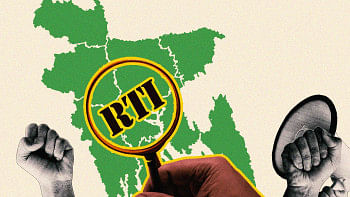Time to put the RTI Act on the right track

The country's fledgling Right to Information (RTI) regime has not escaped the popular demand for sweeping governance reform since the interim government assumed power. This was inevitable as the entire tenure of the RTI Act 2009 in Bangladesh coincided with the 15-year rule of the ousted government. Like many other laws of the land, it too suffered the debilitating consequences of an autocratic rule affecting all democratic institutions of the country. However, the inherent potential of the law to establish people's oversight of government activities remains intact. A new government with a mandate to restore peoples' sovereignty has ignited new hope for it.
Since its inception, the primary objective of this column has been to enhance the effective use of the RTI Act by citizens to promote good governance. The relatively scarce use of the law over the years has yielded some positive outcomes in a limited field of government activities, but no significant gains were made on larger issues of national importance. This is because civil society, a crucial stakeholder, largely remained aloof, primarily due to a lack of trust in the government's commitment to it. The unfriendly and often uncooperative behaviour of many government officials towards information-seekers, and the absence of a people-friendly mechanism to remove impediments and resolve disputes they faced with recalcitrant public officials were additional factors. More importantly, citizens feared that by seeking information of a sensitive nature relating to many shady government activities, they might face the wrath of the officials concerned. With the drastic change of circumstances after the fall of the previous regime in the country, it is heartening to see civil society's growing interest in the act.
Increased attention to the RTI Act was manifested at two important gatherings last month in Dhaka. Participating RTI activists and civil society leaders engaged in a more frank and focused discussion on the importance of the law for democratic rule. They highlighted the difficulties faced by the law users, the need for further improvements to its provisions, the removal of many impediments citizens faced in its application, and the steps needed for their removal, thus providing a roadmap for future action.
At the more inclusive meeting on September 29, held to commemorate the International Right to Information Day, participants underlined the crucial importance of transparency and accountability of public officials to the people under democratic rule. Several recommendations were made, which should be of particular importance to one or more reform commissions set up by the interim government recently to improve overall governance in the country.
The foremost requirement for the success of the RTI Act, everyone agreed, would be the government's loud and clear commitment to its far-ranging objectives and readiness to promote its implementation unstintingly. The perceptible lack of such commitment in the past was recognised as a key factor for why many citizens shied away from using the law. They must feel that the government welcomes their participation in governance matters.
Together with its stated commitment, the government must demonstrate it in practice through measures such as proper training of government officials, including an oath to respect the law's provisions. The training must include appropriate information and records management to ensure easy access when requested by information-seekers. In this context, the code of practice of the United Kingdom is pertinent: "The Right to Information legislation will only be as good as the quality of the records, which are subject to its provisions. Statutory right of access such as this is of little use if reliable records and information are not created in the first place, if they cannot be found when needed....Good records management practice is therefore essential in implementing the RTI Act."
An equally important measure would be inserting more decisive items in the Proactive Disclosure provision of the law than the current mundane list. The government's proactive inclusion of more meaningful information would not only enhance its credentials for more open and accountable pro-people governance, but will also help decrease the burden on public officials from providing them reactively through citizens' requests. This also applies to NGOs which fall within the purview of the law.
Provisions of Section 7 of the RTI Act, containing a list of items exempt from mandatory disclosure, deserve particular attention. Some are too broad and open to misuse for withholding information. Terms like "national security" or "public interest" are susceptible to loose interpretation, allowing authorities to deny legitimate information requests. This prevents public scrutiny and allows cover-up of corruption or inefficiency. It also limits the scope of investigative journalism by denying journalists access to information of public interest.
However, the topic that concerned most RTI enthusiasts and observers is the role of the Information Commission in steering the law and facilitating its proper implementation. The selection and appointment of the commissioners was of utmost importance. The lack of a transparent mechanism for their choice was loudly lamented. There is general agreement that all future commissioners should be selected with utmost objectivity, as prescribed under the law, with attention not only to their honesty and impartiality, but also to their capacity and expertise in the field. The importance of sanctions provided under the law to penalise recalcitrant public officials was also underlined, and so was the need for a more people-friendly Information Commission, since the law was enacted primarily to empower citizens to monitor government activities.
Equally important is to recognise that proper implementation of the RTI Act requires a fundamental transformation of the mindset of all its stakeholders. This is because the law seeks to change an age-old culture of governance based on a colonial concept of the relationship between the ruler and the ruled. Such a change is impossible under any autocratic regime where the idea of people as the reservoir of all state power receives scant acceptance. Under the country's new dispensation, achieved through a popular people's movement, it is time to put a mechanism in place to change that mindset.
The success of the RTI Act anywhere in the world largely depends on the determination and commitment of the citizens to put it to practical use. The people of Bangladesh now have an opportunity to assume that responsibility more confidently. Their role in this regard is as essential for democracy as is their responsibility to participate in the elections and choose their government. Let us remember that while RTI activists in our region resist attempts by their governments to limit the scope of the RTI Act, we in Bangladesh are faced with a golden opportunity to enhance it. Let us not miss it.
Shamsul Bari and Ruhi Naz are chairman and assistant director (RTI), respectively, of Research Initiatives, Bangladesh, RIB. Email: [email protected]
Views expressed in this article are the author's own.
Follow The Daily Star Opinion on Facebook for the latest opinions, commentaries and analyses by experts and professionals. To contribute your article or letter to The Daily Star Opinion, see our guidelines for submission.

 For all latest news, follow The Daily Star's Google News channel.
For all latest news, follow The Daily Star's Google News channel. 









Comments